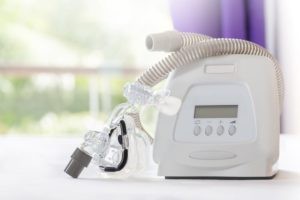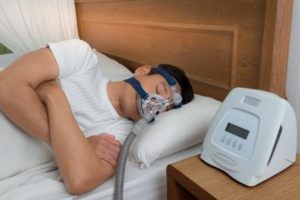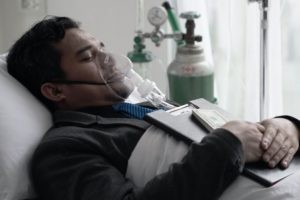Navigating the world of sleep apnea and its treatments can be daunting, especially when it comes to understanding the costs associated with Continuous Positive Airway Pressure (CPAP) therapy. At HOW.EDU.VN, we provide you with the insights you need to make informed decisions about your health and well-being. Understanding the CPAP machine cost, how to purchase a CPAP device, and exploring options without relying on insurance can save you money and provide flexibility. This article delves into the average cost of a CPAP machine, purchasing options, and what to consider when buying one, ensuring you get the best possible care and sleep solutions.
1. What is the Average Cost of a CPAP Machine?
The average cost of a CPAP machine typically ranges from $500 to $1,000 when purchased without insurance. The final price can vary based on the brand, model, features, and accessories included.
When budgeting for a CPAP machine, it’s important to consider the different types of machines and their associated costs. Here’s a breakdown:
- CPAP (Continuous Positive Airway Pressure) Machines: These machines deliver a constant, steady air pressure throughout the night. They are generally the most affordable option, typically ranging from $500 to $800.
- APAP (Automatic Positive Airway Pressure) Machines: APAP machines automatically adjust the air pressure based on your breathing patterns, providing more personalized therapy. These machines usually cost between $600 and $900.
- BiPAP (Bilevel Positive Airway Pressure) Machines: BiPAP machines deliver two different levels of air pressure: one for inhalation and one for exhalation. They are often prescribed for individuals with more complex sleep apnea or other respiratory conditions. BiPAP machines are generally the most expensive, ranging from $800 to $1,200 or more.
While the initial cost of a CPAP machine might seem high, it’s essential to remember that it is a long-term investment in your health. Untreated sleep apnea can lead to various health complications, including heart disease, stroke, and diabetes. By investing in a CPAP machine, you can effectively manage your sleep apnea and reduce your risk of these complications.
The cost of a CPAP machine can differ significantly depending on whether you purchase it directly or bill it through insurance. Often, the price charged to insurance companies can be much higher than what individuals pay out-of-pocket. This difference can substantially increase costs for those with high deductibles. Shopping without insurance allows you to explore various options and potentially save money.
1.1. Factors Influencing CPAP Machine Cost
Several factors can influence the overall cost of a CPAP machine. These include:
- Brand and Model: Different brands and models come with varying features and technologies, impacting their price.
- Features: Advanced features like built-in humidifiers, pressure relief settings, and data tracking capabilities can increase the cost.
- Accessories: While some machines include basic accessories, additional items like specialized masks, tubing, and filters can add to the overall expense.
1.2. CPAP Machine Cost vs. Long-Term Health
While the initial cost of a CPAP machine can be a significant investment, it’s important to consider the long-term health benefits. Treating sleep apnea can reduce the risk of heart disease, stroke, and other serious conditions.
Consider this comparison:
| Expense | Cost |
|---|---|
| CPAP Machine | $500 – $1,000 |
| Untreated Sleep Apnea | Potential long-term health complications and costs |




Investing in a CPAP machine can lead to significant savings in healthcare costs and improved quality of life.
Alt text: A CPAP machine displayed on a bedside table, highlighting its compact design and essential components for sleep apnea therapy.
2. Breaking Down the Costs: CPAP Machine Components
When considering the cost of CPAP therapy, it’s important to break down the individual components and understand their respective prices. This will help you budget effectively and make informed decisions about your purchase. Here’s a closer look at the costs associated with different CPAP machine components:
2.1. CPAP Device
The CPAP device itself is the most significant expense. As mentioned earlier, the average price ranges from $500 to $1,000 without insurance. However, prices can vary depending on the brand, model, and features. Some high-end models with advanced features can cost even more.
2.2. CPAP Mask
The CPAP mask is another essential component of CPAP therapy. It’s the interface between the CPAP machine and your airway, so choosing a comfortable and effective mask is crucial for successful treatment. CPAP mask prices can vary depending on the type, material, and design.
- Nasal Masks: These masks cover the nose and are a good option for individuals who breathe through their nose during sleep. Nasal masks typically cost between $50 and $150.
- Full-Face Masks: These masks cover both the nose and mouth and are recommended for individuals who breathe through their mouth during sleep or experience nasal congestion. Full-face masks usually range from $75 to $200.
- Nasal Pillow Masks: These masks feature small nasal pillows that fit directly into the nostrils. They are lightweight and comfortable and are a good option for individuals who feel claustrophobic with traditional masks. Nasal pillow masks typically cost between $60 and $180.
2.3. CPAP Tubing
CPAP tubing connects the CPAP machine to the mask, delivering pressurized air. Standard CPAP tubing is relatively inexpensive, typically costing between $5 and $30. However, heated tubing is available for individuals who experience condensation in their tubing, which can be uncomfortable and disrupt sleep. Heated tubing usually costs between $20 and $50.
2.4. CPAP Filters
CPAP filters are essential for maintaining the cleanliness and hygiene of your CPAP machine. They prevent dust, pollen, and other particles from entering the machine and your airways. Disposable filters are generally recommended and should be replaced regularly. CPAP filters typically cost between $5 and $20 per pack.
2.5. Humidifier
Many CPAP machines come with a built-in humidifier, which adds moisture to the pressurized air, preventing dryness and irritation of the nasal passages. If your CPAP machine doesn’t have a built-in humidifier, you can purchase one separately. Standalone humidifiers typically cost between $50 and $150.
2.6. Other Accessories
In addition to the essential components, several other accessories can enhance your CPAP therapy experience. These include:
- Mask Liners: These soft fabric liners fit between the mask and your face, preventing skin irritation and pressure sores.
- Chinstraps: These straps help keep your mouth closed during sleep, preventing air from leaking out and reducing dry mouth.
- CPAP Pillows: These specially designed pillows accommodate the CPAP mask and tubing, improving comfort and preventing mask leaks.
- CPAP Cleaners: These devices use ozone or UV light to sanitize your CPAP machine and accessories, killing bacteria and germs.
The cost of these accessories can vary depending on the brand and features.
Understanding the costs associated with each component of CPAP therapy will help you create a realistic budget and make informed decisions about your purchase. While the initial investment may seem significant, remember that CPAP therapy is a long-term investment in your health and well-being.
3. Where to Buy a CPAP Machine Without Insurance
Purchasing a CPAP machine without insurance offers flexibility in choosing where to shop and what model to buy. Here are the primary options for buying a CPAP machine without insurance:
3.1. Online Medical Supply Stores
Numerous online retailers specialize in durable medical equipment, including CPAP machines. These stores often offer a wide selection of devices and accessories at competitive prices.
Pros:
- Convenience: Shop from the comfort of your home.
- Selection: Access a broad range of brands and models.
- Price Comparison: Easily compare prices from different retailers.
Cons:
- No In-Person Assistance: Limited ability to get hands-on help.
- Shipping Costs: Additional expenses for delivery.
3.2. Brick-and-Mortar Medical Supply Stores
Local and regional medical supply stores also sell CPAP machines. These stores provide the opportunity to see the equipment in person and receive personalized assistance from knowledgeable staff.
Pros:
- Personal Assistance: Get expert advice and support.
- Immediate Availability: Take the machine home immediately.
- Hands-On Experience: Test different masks and devices.
Cons:
- Limited Selection: Fewer options compared to online stores.
- Higher Prices: Generally more expensive due to overhead costs.
- Travel Time: Requires visiting a physical store.
3.3. Direct from the Manufacturer
Some CPAP machine manufacturers sell directly to consumers, offering another avenue for purchasing without insurance.
Pros:
- Direct Support: Access to manufacturer expertise.
- Latest Models: Often the first to offer new products.
Cons:
- Limited Selection: Only their own products are available.
- Potentially Higher Prices: May not always be the most affordable option.
3.4. Important Considerations When Buying
Regardless of where you choose to buy, keep the following points in mind:
- Prescription Requirement: A valid prescription from a licensed healthcare provider is required to purchase a CPAP machine.
- Reputable Seller: Ensure you are buying from an authorized and reputable retailer to avoid counterfeit or substandard equipment.
- Warranty and Return Policies: Check the warranty offered by the manufacturer and the return policies of the retailer.
Buying a CPAP machine without insurance requires careful consideration of where to shop and what to buy. By exploring different options and keeping key factors in mind, you can find a quality device that meets your needs and budget.
Alt text: A man sleeping comfortably with a CPAP mask, showcasing the ease and effectiveness of CPAP therapy.
4. Essential Accessories for Your CPAP Machine
To effectively use a CPAP machine, certain accessories are necessary. While some machines come with an initial set of these items, replacements and additional accessories will be needed over time.
4.1. Masks
The mask is a critical component, as it delivers pressurized air from the CPAP machine to your airways. There are three main types of masks:
- Nasal Masks: Cover the nose only and are suitable for those who breathe through their nose.
- Full-Face Masks: Cover both the nose and mouth, ideal for mouth breathers or those with nasal congestion.
- Nasal Pillow Masks: Feature small cushions that fit into the nostrils, offering a minimal contact option.
4.2. Tubing
The tubing connects the CPAP machine to the mask. Standard tubing is typically included with the machine, but heated tubing can enhance comfort by reducing condensation.
4.3. Filters
Filters prevent dust and allergens from entering the CPAP machine, ensuring clean air delivery. They should be replaced regularly to maintain optimal performance.
4.4. Optional Accessories
Several optional accessories can enhance your CPAP therapy experience:
- Mask Liners: Provide a barrier between the mask and skin, reducing irritation.
- Headgear and Straps: Help secure the mask in place.
- Tube Holders: Keep the tubing from getting tangled.
- CPAP Cleaners: Devices to sanitize the machine and accessories.
- Special Pillows: Designed for comfort while wearing a CPAP mask.
4.5. Maintenance and Replacement Schedule
Regular maintenance and timely replacement of accessories are essential for optimal CPAP therapy. Here’s a suggested schedule:
| Accessory | Replacement Frequency |
|---|---|
| Mask | 3-6 months |
| Tubing | 3 months |
| Filters | 1-2 weeks |
| Mask Liners | Daily |
| Headgear | 6 months |
5. Types of CPAP Machines Available
Understanding the different types of CPAP machines is crucial when making a purchase. Each type caters to specific needs and preferences, so knowing the distinctions can help you choose the most suitable option.
5.1. CPAP (Continuous Positive Airway Pressure) Machines
CPAP machines deliver a constant, steady pressure of air throughout the night. This consistent pressure keeps the airways open, preventing pauses in breathing and ensuring a restful sleep. CPAP machines are generally prescribed for individuals with obstructive sleep apnea (OSA).
Key Features:
- Fixed Pressure: Delivers a single, pre-set pressure level.
- Simple to Use: Easy to set up and operate.
- Cost-Effective: Generally the most affordable type of CPAP machine.
Pros:
- Consistent and reliable therapy
- Easy to maintain and clean
- Suitable for most cases of OSA
Cons:
- May feel uncomfortable for some users due to the constant pressure
- Not ideal for individuals with varying pressure needs
5.2. APAP (Automatic Positive Airway Pressure) Machines
APAP machines automatically adjust the air pressure based on your breathing patterns. These machines continuously monitor your breathing and adjust the pressure as needed to maintain open airways. APAP machines are often preferred for individuals with positional sleep apnea or those who experience pressure changes throughout the night.
Key Features:
- Automatic Pressure Adjustment: Adjusts pressure levels based on your breathing.
- Flexibility: Accommodates varying pressure needs.
- Comfort: Can be more comfortable than CPAP machines for some users.
Pros:
- Personalized therapy based on individual needs
- Improved comfort and compliance
- Suitable for individuals with varying pressure requirements
Cons:
- More expensive than CPAP machines
- May not be necessary for individuals with stable pressure needs
5.3. BiPAP (Bilevel Positive Airway Pressure) Machines
BiPAP machines deliver two different levels of air pressure: a higher pressure during inhalation and a lower pressure during exhalation. This dual-pressure setting makes it easier to breathe in and out, making BiPAP machines suitable for individuals with more complex sleep apnea or other respiratory conditions.
Key Features:
- Dual Pressure Settings: Higher pressure for inhalation, lower pressure for exhalation.
- Comfortable Breathing: Easier to breathe compared to CPAP machines.
- Suitable for Complex Cases: Ideal for individuals with respiratory conditions or central sleep apnea.
Pros:
- Improved breathing comfort
- Effective for individuals with high-pressure requirements
- Suitable for complex respiratory conditions
Cons:
- Most expensive type of CPAP machine
- May require more adjustments and monitoring
5.4. Choosing the Right Type of CPAP Machine
The best type of CPAP machine for you will depend on your individual needs and preferences. Consult with your doctor or a sleep specialist to determine which type of machine is most appropriate for your specific condition.
Here’s a quick guide to help you choose:
| Type of Machine | Best For |
|---|---|
| CPAP | Obstructive sleep apnea (OSA) with stable pressure needs |
| APAP | Positional sleep apnea or varying pressure needs |
| BiPAP | Complex sleep apnea, respiratory conditions, high-pressure needs |
6. Understanding CPAP Prescription Requirements
A valid prescription from a licensed healthcare provider is required to purchase a CPAP machine. This is because CPAP therapy involves medical-grade equipment that needs to be properly calibrated and customized for individual needs.
6.1. Why a Prescription is Necessary
- Proper Diagnosis: A sleep study and medical evaluation are necessary to diagnose sleep apnea and determine the appropriate pressure settings for your CPAP machine.
- Customized Treatment: A prescription ensures that your CPAP machine is set to the correct pressure levels, optimizing the effectiveness of the therapy.
- Safety: Using a CPAP machine without a prescription can be dangerous and may lead to adverse health outcomes.
6.2. How to Obtain a Prescription
- Consult Your Doctor: Schedule an appointment with your primary care physician or a sleep specialist.
- Sleep Study: Your doctor may recommend a sleep study to diagnose sleep apnea. This study can be conducted in a sleep lab or at home.
- Evaluation: After the sleep study, your doctor will evaluate the results and determine if CPAP therapy is appropriate for you.
- Prescription: If CPAP therapy is recommended, your doctor will provide you with a prescription that includes the appropriate pressure settings and other relevant information.
6.3. Alternative Options for Obtaining a Prescription
If you don’t have a primary care physician or sleep specialist, several alternative options are available for obtaining a CPAP prescription:
- Online Sleep Studies: Several reputable companies offer at-home sleep studies that can be completed remotely.
- Telemedicine: Telemedicine platforms connect you with licensed healthcare providers who can evaluate your symptoms and provide a prescription if necessary.
6.4. Verifying the Prescription
Once you have a prescription, verify that it includes the following information:
- Your name and date of birth
- The type of CPAP machine prescribed (CPAP, APAP, or BiPAP)
- The pressure settings
- The doctor’s name, signature, and contact information
- The date of the prescription
Ensure that the prescription is valid and up-to-date before purchasing a CPAP machine.
Alt text: A woman comfortably sleeping with a CPAP mask, demonstrating the proper use and effectiveness of CPAP therapy for sleep apnea.
7. Exploring Alternatives to CPAP Therapy
While CPAP therapy is the gold standard for treating sleep apnea, several alternatives are available for individuals who cannot tolerate or prefer not to use a CPAP machine.
7.1. Oral Appliances
Oral appliances are custom-fitted mouthpieces that help keep the airway open during sleep. These devices are typically prescribed by a dentist or orthodontist and can be a good option for individuals with mild to moderate sleep apnea.
Types of Oral Appliances:
- Mandibular Advancement Devices (MADs): These devices move the lower jaw forward, opening the airway.
- Tongue-Retaining Devices (TRDs): These devices hold the tongue in place, preventing it from blocking the airway.
Pros:
- Non-invasive and easy to use
- Portable and convenient for travel
- May be more comfortable than CPAP for some individuals
Cons:
- May cause jaw pain, teeth discomfort, or dry mouth
- Not as effective as CPAP for severe sleep apnea
7.2. Positional Therapy
Positional therapy involves training yourself to sleep on your side rather than your back. Sleeping on your back can worsen sleep apnea symptoms, as gravity can cause the tongue and soft tissues in the throat to collapse and block the airway.
Techniques for Positional Therapy:
- Sewing a tennis ball into the back of your pajama top: This prevents you from rolling onto your back during sleep.
- Using a positional therapy device: These devices vibrate or provide other stimuli when you roll onto your back.
Pros:
- Non-invasive and inexpensive
- Can be effective for individuals with positional sleep apnea
Cons:
- May be difficult to maintain long-term
- Not as effective as CPAP for severe sleep apnea
7.3. Surgery
Several surgical procedures can treat sleep apnea by widening the airway or removing excess tissue. Surgery is typically reserved for individuals who have not responded to other treatments.
Types of Surgical Procedures:
- Uvulopalatopharyngoplasty (UPPP): This procedure removes excess tissue in the throat, including the tonsils, adenoids, and uvula.
- Maxillomandibular Advancement (MMA): This procedure moves the upper and lower jaws forward, widening the airway.
- Genioglossus Advancement (GA): This procedure pulls the tongue forward, preventing it from blocking the airway.
Pros:
- Can provide a long-term solution for sleep apnea
- May eliminate the need for CPAP therapy
Cons:
- Invasive and carries risks of complications
- May not be effective for all individuals
7.4. Lifestyle Changes
Lifestyle changes can also help improve sleep apnea symptoms:
- Weight Loss: Losing weight can reduce the amount of tissue in the neck and throat, opening the airway.
- Avoiding Alcohol and Sedatives: Alcohol and sedatives can relax the muscles in the throat, worsening sleep apnea.
- Quitting Smoking: Smoking can irritate and inflame the airways, increasing the risk of sleep apnea.
7.5. EPAP Therapy
Expiratory Positive Airway Pressure (EPAP) therapy involves using a small, disposable device that sticks over the nostrils and uses your own breath to create pressure and keep the airway open.
Pros:
- Easy to use
- Doesn’t require a machine
- Can be a good alternative for mild sleep apnea
Cons:
- May not be as effective as CPAP for more severe sleep apnea
- Can cause nasal discomfort
8. Factors to Consider Before Buying a CPAP Machine
Before purchasing a CPAP machine, several factors should be considered to ensure you select the most suitable device for your needs.
8.1. Type of Sleep Apnea
The type of sleep apnea you have will influence the type of CPAP machine recommended by your doctor. Obstructive sleep apnea (OSA) is the most common type, but central sleep apnea (CSA) and mixed sleep apnea require different treatment approaches.
8.2. Mask Type
The mask is a critical component of CPAP therapy, and comfort is essential for compliance. Consider the following mask types:
- Nasal Masks: Cover the nose only and are suitable for those who breathe through their nose.
- Full-Face Masks: Cover both the nose and mouth, ideal for mouth breathers or those with nasal congestion.
- Nasal Pillow Masks: Feature small cushions that fit into the nostrils, offering a minimal contact option.
8.3. Machine Features
CPAP machines come with various features that can enhance your therapy experience. Consider the following:
- Humidifier: Adds moisture to the air to prevent dryness and irritation.
- Ramp Feature: Gradually increases the air pressure to help you fall asleep more comfortably.
- Data Tracking: Monitors your sleep data to track your progress and identify any issues.
- Pressure Relief: Reduces the pressure during exhalation to make breathing easier.
8.4. Noise Level
Some CPAP machines are quieter than others. If you are sensitive to noise, look for a machine with a low decibel rating.
8.5. Portability
If you travel frequently, consider a portable CPAP machine that is lightweight and easy to transport.
8.6. Budget
CPAP machines vary in price, so set a budget before you start shopping. Remember to factor in the cost of accessories and replacement parts.
8.7. Warranty and Support
Check the warranty offered by the manufacturer and the availability of technical support. A good warranty can protect you from unexpected repairs or replacements.
9. Tips for Saving Money on CPAP Machines
While CPAP machines can be a significant investment, several strategies can help you save money on your purchase.
9.1. Shop Around
Compare prices from different retailers, both online and in-store. Prices can vary significantly, so it pays to do your research.
9.2. Consider Refurbished Machines
Refurbished CPAP machines can be a more affordable option. Ensure that the machine has been properly inspected and certified by a reputable dealer.
9.3. Look for Sales and Discounts
Many retailers offer sales and discounts on CPAP machines, especially during holidays or special promotions.
9.4. Use Coupons and Promo Codes
Search for coupons and promo codes online before making your purchase. Many websites offer discounts on medical equipment.
9.5. Check with Your Insurance Provider
Even if you don’t have full coverage for a CPAP machine, your insurance provider may offer partial reimbursement or discounts.
9.6. Consider a Used CPAP Machine
While it’s generally not recommended to buy a used CPAP machine due to hygiene concerns, you may be able to find a gently used machine from a trusted source.
9.7. Buy Generic Accessories
Generic CPAP accessories, such as masks and tubing, can be more affordable than brand-name options.
9.8. Maintain Your Equipment
Regular maintenance can extend the life of your CPAP machine and accessories, saving you money on replacements.
10. The Future of CPAP Technology
CPAP technology is continually evolving, with new innovations aimed at improving comfort, convenience, and effectiveness.
10.1. Smaller and More Portable Machines
Manufacturers are developing smaller and more portable CPAP machines that are easier to travel with. These machines often include features like integrated batteries and wireless connectivity.
10.2. Smart CPAP Machines
Smart CPAP machines use sensors and algorithms to automatically adjust pressure settings based on your breathing patterns. These machines can also track your sleep data and provide personalized feedback.
10.3. Improved Mask Designs
New mask designs are focused on improving comfort and reducing leaks. These masks often feature lightweight materials and innovative sealing technologies.
10.4. Integration with Telehealth
CPAP machines are increasingly being integrated with telehealth platforms, allowing doctors to remotely monitor your therapy and make adjustments as needed.
10.5. Personalized Therapy
Future CPAP technology will likely focus on personalized therapy, with machines that can adapt to your individual needs and preferences.
Alt text: A display of various CPAP masks and accessories, emphasizing the range of options available for personalized sleep apnea treatment.
11. Finding Support and Resources for CPAP Users
Starting CPAP therapy can be challenging, and it’s essential to have access to support and resources.
11.1. Support Groups
Support groups provide a safe and supportive environment for CPAP users to share their experiences and learn from others.
11.2. Online Forums
Online forums are a great resource for finding information and connecting with other CPAP users.
11.3. CPAP Clinics
CPAP clinics offer specialized care and support for CPAP users, including mask fittings, troubleshooting, and education.
11.4. Healthcare Providers
Your doctor or sleep specialist can provide ongoing support and guidance throughout your CPAP therapy journey.
11.5. CPAP Manufacturers
CPAP manufacturers often offer educational resources and technical support for their products.
11.6. Patient Advocacy Groups
Patient advocacy groups can provide information and support for individuals with sleep apnea.
12. Frequently Asked Questions (FAQs) About CPAP Machines
12.1. Do I really need a prescription for a CPAP machine?
Yes, a valid prescription is required to ensure proper diagnosis and customized treatment.
12.2. How often should I replace my CPAP mask?
It is recommended to replace your CPAP mask every 3-6 months for hygiene and optimal performance.
12.3. Can I buy a CPAP machine online without insurance?
Yes, many online retailers offer CPAP machines without requiring insurance.
12.4. What are the benefits of using a humidifier with my CPAP machine?
A humidifier adds moisture to the air, preventing dryness and irritation in your nasal passages.
12.5. How do I clean my CPAP machine?
Regular cleaning is essential. Wash your mask and tubing daily with mild soap and water and disinfect your machine weekly.
12.6. Can I travel with my CPAP machine?
Yes, CPAP machines are typically allowed as carry-on items. Check with your airline for specific guidelines.
12.7. What should I do if my CPAP mask is leaking?
Ensure your mask is properly fitted and tightened. If leaks persist, try a different mask size or type.
12.8. How do I adjust the pressure settings on my CPAP machine?
Consult your doctor or sleep specialist for any adjustments to your pressure settings.
12.9. Can CPAP therapy cure sleep apnea?
CPAP therapy manages sleep apnea symptoms but does not cure the condition. It requires continuous use for effectiveness.
12.10. Are there any side effects of using a CPAP machine?
Common side effects include dry mouth, nasal congestion, and skin irritation from the mask. These can often be managed with proper mask fitting and humidification.
Conclusion
Understanding the costs associated with CPAP machines and exploring your purchasing options is crucial for managing sleep apnea effectively. At HOW.EDU.VN, we are committed to providing you with expert insights and resources to make informed decisions about your health. By considering the factors outlined in this article, you can navigate the process of buying a CPAP machine with confidence and ensure you receive the best possible care. Don’t let the challenges of finding expert advice hold you back – connect with our team of over 100 renowned PhDs at HOW.EDU.VN today and get the answers you deserve. Let us help you improve your sleep, health, and overall well-being.
Ready to take the next step? Contact us today for personalized guidance and support.
Address: 456 Expertise Plaza, Consult City, CA 90210, United States
WhatsApp: +1 (310) 555-1212
Website: how.edu.vn
Get the expert advice you need and start your journey to better sleep today!

